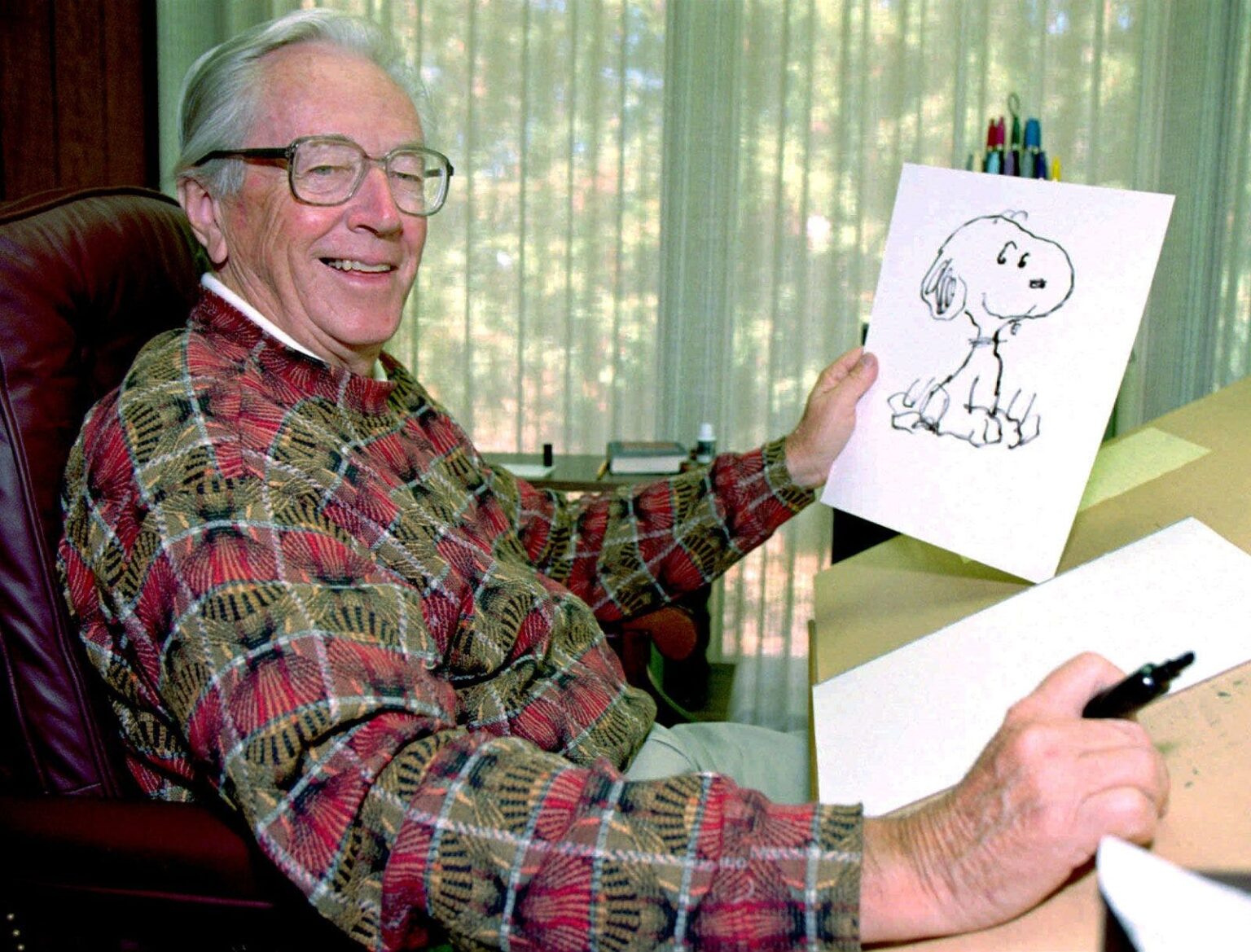The man who gave us the eternal optimist Charlie Brown, his philosophising canine Snoopy and the incorrigible Lucy remains one of the best cartoonists we’ve ever seen.
The late great Charles M. Schulz, who created the comic strip Peanuts, was born on 26 November 1922 and passed away on 12 February 2000. He would have turned 99 this November. I used to read the syndicated strip in the newspapers as a boy but the first Peanuts collection I read was when I got a Fawcett paperback collection when I was around 14.
I was immediately hooked. The deceptively simple, uncluttered, almost minimalist panels and the wonderful characterization, rare in a newspaper strip, caught my attention. I felt an immediate connection to Charlie Brown, a born loser but one who never gives up and keeps coming back for more.
Despite his unavailing attempts to kick the football held, and then whisked away at the last moment by the incorrigible Lucy, or his vain attempts to fly a kite or win a baseball game, Charlie Brown remained an eternal optimist. While he was sensitive, awkward and even seemed to have a bit of an inferiority complex, his doleful demeanour belied his attitude. He never gave up on his faith in human nature and his belief that untiring efforts would ultimately bear fruit.
After each setback, he would still retain his faith in human nature and run up for the umpteenth time to kick the football. The fact that Lucy pulls it away every time does not faze him. The next time he is game again, truly believing that this time Lucy’s better nature will prevail. Similarly, he remains optimistic even after losing several kites to the ‘kite eating tree’ or when he trudges out to the mound fervently believing that this time he will pitch a perfect game. If there is a little bit of Charlie Brown in you then you are a better person.
The Strip Club
The crabby, bossy curmudgeonly Lucy, fussbudget extraordinaire is a wonderful if exasperating character. All of us have met up with a Lucy some time in our life. Her younger brother Linus, infant philosopher and spouter of theology, lost without his security blanket is another brilliant character. He firmly believes in the Great Pumpkin, despite the derision of others and the fact that the Great Pumpkin fails to turn up every Halloween.
Charlie’s younger sister Sally, constantly murders the English language and is infatuated with Linus. She has a very ambiguous relationship with the school and hates schoolwork. We know how you feel, Sally. Her interactions with the school building form some of the funniest and most thought-provoking parts of the strip. Schroeder the musical genius, lover of Beethoven and completely oblivious of Lucy’s crush on him is another recurring character.
Peppermint Patty, Marcie, Franklin, Pig Pen constantly trailing a cloud of dust, the little red-headed girl that Charlie adores from afar, Woodstock the little bird all play their parts in this wonderful strip. Franklin was probably one of the first African American characters to feature regularly in a syndicated strip, making his first appearance in 1968. Phrases from the strip-like ‘ Good Grief’ and ‘ Security Blanket’ have become part of the language that will always be associated with the strip.
The character that equalled the popularity of Charlie Brown and became the main focus of the strip is Snoopy, Charlie Brown’s beagle. Snoopy refers to Charlie Brown as ‘that round-headed kid’. He boasts of a pool table and a library in his doghouse which is adorned with paintings by the likes of Van Gogh.
He lives an active fantasy life where he is the world-famous World War Flying Ace taking on the infamous Red Baron, a world-famous attorney complete with a black briefcase, the college hero Joe Cool, a world-famous secret agent etc. This Walter Mitty-like dog is probably the most famous canine in the history of literature, his likeness adorning millions of pieces of merchandise.
Merchandising Pioneer
Peanuts was the first strip cartoon that sparked a highly successful wave of merchandising using its universally loved characters. Toys, figurines, games, posters, decals, pop up books, TV series and films and several others earned Schulz over a million and was the trailblazer for several other creators who successfully merchandised their characters. Schulz may have been the man who created ‘Peanuts’ but he didn’t make peanuts, quite the opposite.
Peanuts started in 1950 and continued till 2000. It was probably the most influential newspaper strip ever and at its peak ran in over 2,600 newspapers. Schulz’s blend of gentle satire, laugh out loud gags, homespun philosophy and pitch-perfect dialogue struck a chord like no other strip had done before.
He was a two-time winner of the National Cartoonist Society’s ‘ Reuben’ award, a winner of the Society’s Milt Caniff award for Lifetime Achievement and several other awards, too numerous to detail. The crowning glory was the ‘Congressional Gold Medal ‘ the highest civilian honour the US Legislature can bestow. Unfortunately, Schulz passed away just before the award was announced and it was received by his widow.
Schulz inspired many other cartoonists including Bill Watterson, Sheldon Mayer, Garry Trudeau, Berke Breathed and others. The strip was about kids but it certainly wasn’t for kids. The older you grow the more you appreciate the strip. It is a strip that can be re-read several times and each time you notice and appreciate something you overlooked earlier.
There have been several great strips/comics based on young children including Little Lulu, Sugar and Spike, Calvin and Hobbes and ‘Dennis the Menace. But for me, Peanuts will always be the first among equals.
Click here to read Vineeth Abraham’s column ShelfLife

